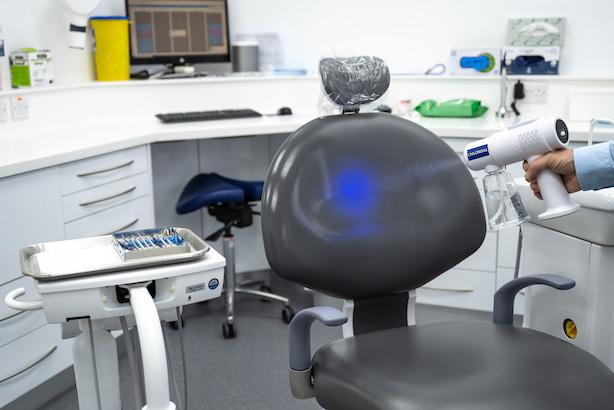It’s a clean sweep
An award-winning Scottish company’s technology could transform practices’ approach to safety and sustainability
If you have bought Warburtons or Kingsmill Thins, wraps from Asda, Tesco or Morrisons, or are partial to Walkers Shortbread, then you will have used a technology – Reseal-it- that Ken Adams helped develop and popularise. More recently, he invented a technology that allows lidding film to be recycled and which is now used on products such as coleslaw and savoury snacks sold in Tesco and on grapes and blueberries in Asda.
Convenience for the consumer and environmental sustainability have been at the heart of Kenís work over the years. One thing that has niggled him for a while, though, is the content and environmental impact of cleaning products that we use daily at home. The COVID-19 pandemic gave Ken the impetus to explore the potential of bringing a technology to the market which disinfects spaces, is non-toxic and environmentally friendly.
Last year, he started his own company, based in Renfrew, and has launched a brand – Chlorisal – that is based on a unique formulation made from electrolysed water. It is described as the only technology to offer disinfection of surfaces, skin, and the air at the same time. It is said to kill 99.995 per cent of all viruses, bacteria, spores, and fungi, as well as being hypoallergenic and 100 per cent biodegradable.
It comes with the lowest carbon footprint of any comparable product
“When Chlorisal meets bacteria, it causes an imbalance on the bacteria’s cell surface, breaking down its defences and allowing an active ingredient, hypochlorous acid, which accounts for only 0.026 per cent of the product, to render it harmless,” explained Ken. “For typical applications, Chlorisal will perform at least 30 times faster than the best household bleach, plus it is also very effective at killing viruses, all without the use of harsh chemicals.”
His company has developed a range of products – a disinfectant, a cleaner and degreaser, a sanitiser, and an atomiser – incorporating Chlorisal. While this alone will be of interest to the dental profession – which has currently both safety and sustainability very much on its mind – what will certainly spark interest, when aiming to keep people and spaces safe at the same time, is its range of application systems, which include fogging and misting machines.



“I was initially involved with electrolysed water three years ago”, Ken recalled, “back in the days when we had not heard of COVID. The opportunity to reduce the levels of harsh chemicals being introduced to our homes and workplaces was exciting, but I decided to remain in the packaging business at the time. Then, with the onset of COVID, the world changed, and I took the decision to take more control of my own destiny and launched Chlorisal in November 2020.
“While there are essentially two products – a disinfectant and a cleaning product – Chlorisal is focused on how they are used by the consumer. For example, the same bulk container can be used to refill the sanitiser and the disinfectant. We are focused on products which meet the needs of our customers, and this is the ethos behind the equipment we supply. The products have been selected as being the best value for money for each application. However, whenever we can help customers use their existing equipment, we will do so.”
What have been the challenges of bringing the product to market?
“Despite being around for many years, electrolysed water is a relatively unknown technology. Previously, a short shelf-life and high cost prevented widespread adoption. The recent advances in manufacturing capabilities have addressed those issues.
“We can now offer a 12-month shelf-life and the cost is comparable with many products in the market. There is still a perception that hand sanitiser must contain alcohol and that disinfectant must smell of bleach. Neither are correct and in fact; Chlorisal is far more effective than either alcohol or bleach and comes without any of the downsides.”
With the technology now established, Ken is focused on bringing it to consumers and businesses. “For consumers, there is an online store on the website. We have received a great response from across the UK and we are building a growing base of loyal repeat customers,” he said. “However, the main focus has been on B2B sales. Working with a number of key customers across a diverse range of including manufacturing, transport, education, and care, we are building a UK-wide customer base.”
It’s been a whirlwind for Ken and his team. But there have been moments when they take in what has been achieved; developing a company and brand that has been recognised as ‘The Most Innovative New Business – Scotland’ at The Innovation and Excellence Awards 2021.
“Chlorisal is able to offer a solution that no other technology can offer, namely the disinfection of surfaces, skin, and the air,” said Ken. “The dental professional is particularly well placed to take advantage of the specific benefits this solution can bring. Improved performance, reduced risks, and increased efficiencies are absolutely key to the dental profession.
“That it comes with the lowest carbon footprint of any comparable product and is 100 per cent biodegradable reassures customers that unrivalled disinfection can be achieved with a product which is both kind to us and kind to the planet.”

Comments are closed here.